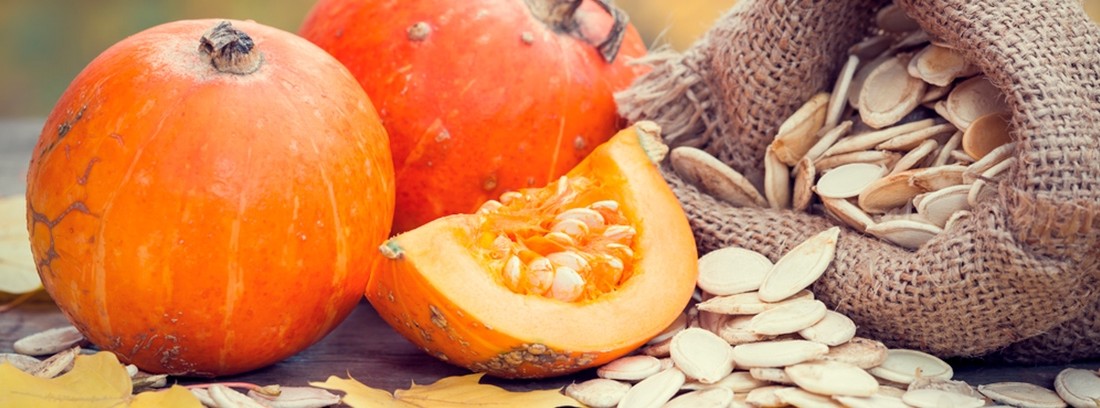Pumpkin, the fruit of autumn

Pumpkin is a vegetable sweeter than most, and although it is true that this is due to a higher sugar contentWe should not consider that it is a food rich in sugar at all. Pumpkin is a great food that can come in handy for those who are somewhat reluctant to
It is reputed to be sweeter, more caloric and more sugary than other vegetables but in small quantities. For example, 100 grams of pumpkin provides:
- 30 Kcal: similar to the energy provided by the same amount of red pepper, mushroom or white onion.
- 3.5 g : which means 1 g more than the sugar contained in 100 g of green beans or eggplant and less than half the sugar contained in the typical sachet of the bar, which is usually 8 g.
Nutritional value of pumpkin
- Water
- Fiber
- Potassium
- Vitamin A
- Carotenoids
Ideas for eating pumpkin
The pumpkin, having that sweet spot, can be used in both savory and sweet dishes, in main dishes or in desserts and pastries:
- A classic is the one, which can be made only with pumpkin and or by adding sautéed or sautéed onion or leek. It can also be elaborated cpumpkin row with potato or mixed with many other vegetables.
- Another option is to cut it into small cubes and rstew or sauté it along with other vegetablesIt can be used as an accompaniment to a meat, or as part of a salad or to make multiple recipes with it, a risotto, a lasagna, a hummus and let's not talk about pasta stuffed with pumpkin ... And it can be made stuffed!
- In its sweet version we can make cream with pear, pumpkin jam, different types of cake pumpkin, pumpkin tortillas with cinnamon typical of the Canary Islands ...
- Let's not forget that the seeds are also consumed, that we can add to a yogurt, a salad or any other dish, in addition to preparing delicious loaves with them.
Pumpkin oil
In Slovenia, the use of pumpkin seed oil is typical, it has a mild flavor and a dark color that dyes what it touches green. Can be used for season any type of dish, just like we use the olive one here.
Who is it good for and who is not?
It is recommended for:
- Easily digestible diets: the pulp of pumpkin It is rich in mucilage to which a protective role of the gastroduodenal mucosa and anti-ulcer properties is attributed, so it is considered suitable in people suffering from ailments such as
- People (adults or children) with an aversion to vegetables: its color, aroma and flavor make it quite different from all vegetables, at least from green ones, which are sometimes rejected. It is a good way to eat vegetables and, in addition, in a thousand ways.
- Athletes: potassium is one of the minerals involved in muscle contraction and maintains the electrolyte balance of our body.
- In episodes of vomiting or diarrhea or other situations of increased potassium needs: in these cases we can help replace the loss of potassium caused by these episodes with the intake of foods rich in potassium such as pumpkin.
They are not suitable in case:
- Tendency to suffer from flatulenceIn some cases, especially undercooked, pumpkin has been linked to flatulence. It all depends on the way of cooking and personal sensitivity. For example, a well-cooked butternut squash will cause less flatulence than whole, undercooked butternut squash.
- Kidney problems or other potassium limitationsKidney patients who have to limit potassium intake should control pumpkin consumption due to its high potassium content.
Buying and conservation advice
- Whether we choose a pumpkin from winter or summer, it is advisable to acquire firm specimens with intact skin.
- On the other hand, it is preferable that retain the tail or peduncle Well, if you don't have it, the pumpkin will lose moisture. Now, if we choose a summer squash we must choose one of medium size, the largest ones usually have the bitterest meat.
- The pumpkin must be tender but firm, with the shiny skin, very soft and not excessively hard. Dullness or tough or rough skin are signs that your meat is dry.
- By purchasing a winter squashIt is recommended to choose very mature specimens with thick rind (a soft skin indicates that it is not yet ripe). Also, winter squash should be heavy in relation to its volume.
What you should know:
- Season: The most consumed are usually winter but there are different varieties throughout the year, as there are summer squash and winter squash.
- Profits: it is attributed protective properties of the gastric mucosa, it is rich in antioxidants, carotenoids, and a great source of potassium.
- Ideal in: diets of easy digestion, and for children or adults with aversion to green vegetables.
Mercè Gonzalo Diploma in Human Nutrition and Dietetics Bachelor of Food Science and Technology
(Updated at Apr 13 / 2024)